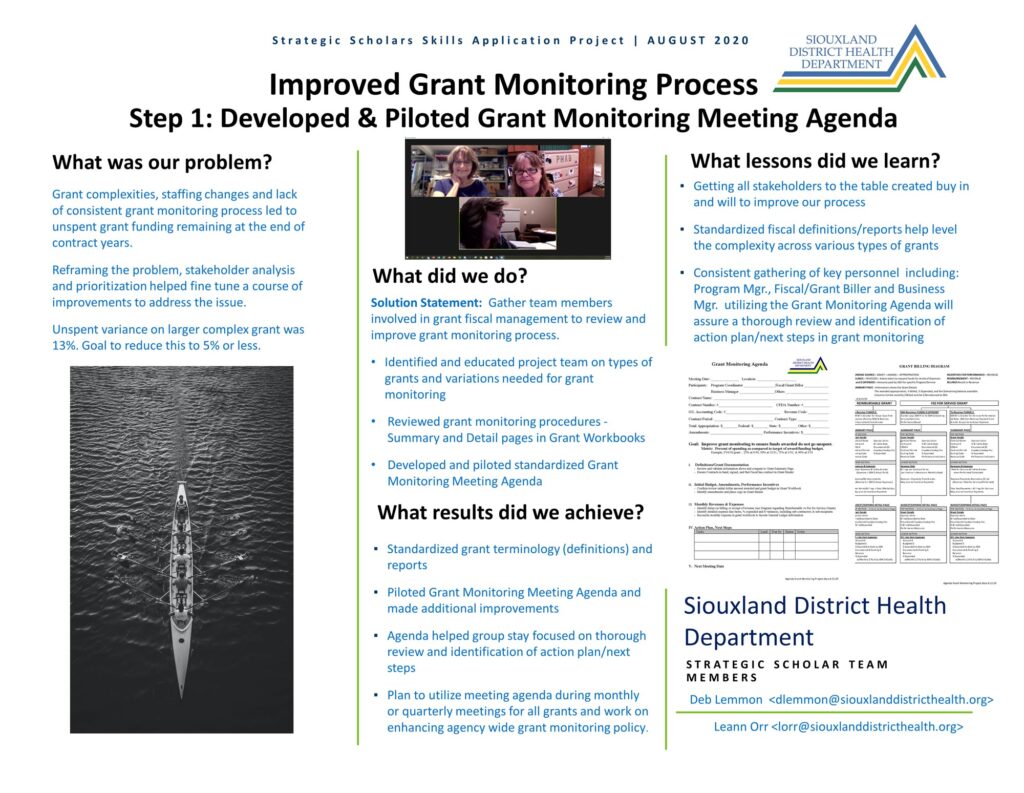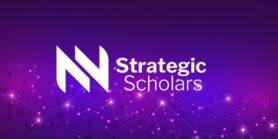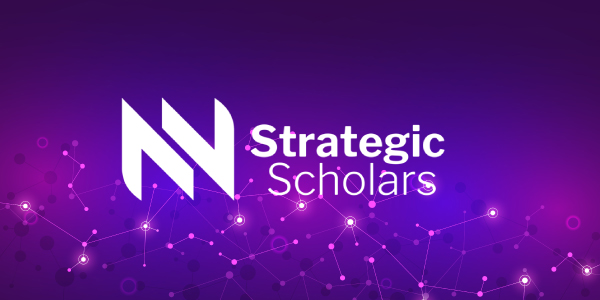Strategy, Skills, and Solutions: CDC and NNPHI Lead Strategic Scholars Program on Resource Management
- By: Laila Fox, MPH and Meghan Wolfe
- Date
These strategic skills were identified in a 2017 report from the de Beaumont Foundation entitled Building Skills for a More Strategic Public Health Workforce: A Call to Action, which notes that the public health workforce must “link perspectives” to influence other sectors and “learn from other specialties to tackle today’s pressing community health challenges.”[1] Resource management has been an acute problem in public health for decades, as leaders are asked to do significantly more with drastically less. According to the de Beaumont report, “all levels of the public health workforce would benefit from additional training in financial and resource management skills, leadership skills, communications skills, and management of teams.” Additionally, the 2017 Public Health Workforce Interest and Needs Survey (PH WINS) demonstrated budget and financial management as the top training need identified by public health professionals.
The most recent Strategic Scholars cohort focused on resource management and engaged participants in didactic training modules, group and individual coaching sessions, and a culminating experience project. This multifaceted approach is designed to help public health professionals build skills and identify strategies that lead to actionable changes in programs, policies, and processes. To facilitate collaborative learning, Scholars applied in teams of two, with one programmatic representative and one administrative or financial representative. Teams hailed from diverse health departments across the country and include representation from state, local, Tribal, and territorial health departments.
Each team developed a skill application project that was based on what they learned from the Building Expertise in Administration & Management (BEAM) training program. BEAM is a certificate course that consists of a series of six self-paced modules designed to advance financial and managerial skills for public health professionals. The modules helped Scholars understand who the players are in the public health financing process and absorb the information presented, says Deb Lemmon, who was a part of this cohort and works as the Business Manager at the Siouxland District Health Department in Iowa.
Each team also had three learning sessions with a coach. Scholars debriefed and reflected on the modules with support from the coach, then chose a skill application project to implement what they had learned and apply it to a real issue or problem. Each team examined their issue, created a problem statement, incorporated metrics and data, and identified options for solutions and an implementation plan. The program culminated in a project showcase during which each team presented their project to the group.
NNPHI staff spoke with the Siouxland District Health Department team to understand the impact of their recent experience. Deb Lemmon and her colleague Leann Orr, who serves as QA/QI Coordinator at Siouxland, formed their agency’s Strategic Scholars team. During their recent accreditation process, Deb and Leann learned that performance management and QI practices are essential to drive improvement change.
Their health department recently transitioned to a new software platform that will help Siouxland monitor the appropriate use of all funding resources along with other improvements in its financial resource management process. These changes primed their department for participation in the Strategic Scholars program and ultimately for the skill application project which guided Deb and LeAnn in the reviewing and reframing of their internal grant monitoring process.
The Siouxland team focused on improving their grant monitoring processes to address the problem of unspent funds at the end of grant years. By setting meetings with relevant stakeholders and establishing standard agendas and procedures, finance and programmatic teams are now working together to monitor grant progress and spending. LeAnn says the new process will help amplify outcomes across the agency and potentially affect everything the department does.
“I enjoyed working on this quality improvement project in the agency, as a financial one; it included a broader range of people, not just one division. Our project has the potential to affect everything that we do. With this improved grant monitoring process, the outcomes will be amplified and compounded across the agency.” – Leann Orr, QA/QI Coordinator, Siouxland District Health Department
The Strategic Scholars program will launch its third cohort in March 2021 where selected Scholars will have the opportunity to build another strategic skill—and apply that learning to their work. Lemmon shared these words of advice for those considering applying to the program: “There’s always something to learn and it’s nice to step back from the day-to-day work to focus on a problem that needs solving.”
 [1] From Building Skills for a More Strategic Public Health Workforce: A Call to Action, The de Beaumont Foundation, 2017, https://www.debeaumont.org/wp-content/uploads/2019/04/Building-Skills-for-a-More-Strategic-Public-Health-Workforce.pdf
[1] From Building Skills for a More Strategic Public Health Workforce: A Call to Action, The de Beaumont Foundation, 2017, https://www.debeaumont.org/wp-content/uploads/2019/04/Building-Skills-for-a-More-Strategic-Public-Health-Workforce.pdf

 The Strategic Scholars Program, a training experience developed and implemented by the Centers for Disease Control and Prevention (CDC) and the National Network of Public Health Institutes (NNPHI), uses a community of practice cohort model and multiple learning modalities to build governmental public health workforce capacity in
The Strategic Scholars Program, a training experience developed and implemented by the Centers for Disease Control and Prevention (CDC) and the National Network of Public Health Institutes (NNPHI), uses a community of practice cohort model and multiple learning modalities to build governmental public health workforce capacity in  Subscribe To Our Communications
Subscribe To Our Communications